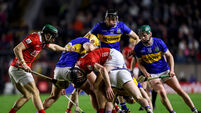Michael Clifford: ‘Golfgate’ politicians left to languish in the rough

Some feared the worst when George Foreman began trending on social media last weekend.
Oh no, the lovable old boxer must have popped his clogs. When celebrities long disappeared from public life, and known to be in advanced years, suddenly trend on Twitter, it’s usually to mark their passing.













